U.S. Unemployment Soars Whilst Fed Funnels More Cash to the Banksters
Stock-Markets / Financial Markets 2009 Jul 03, 2009 - 03:03 AM GMT Employment situation takes a turn for the worse
Employment situation takes a turn for the worse
Nonfarm payroll employment continued to decline in June (-467,000), and the unemployment rate was little changed at 9.5 percent, the Bureau of Labor Statistics of the U.S. Department of Labor reported today. Job losses were widespread across the major industry sectors, with large declines occurring in manufacturing, professional and business services, and construction.
The report showed that hourly earnings stagnated, offering little evidence the Obama administration’s stimulus package is shoring up the labor market. The payroll decline was more than forecast and followed a 322,000 drop in May, according to Labor Department figures released today in Washington. The jobless rate jumped to 9.5 percent, the highest since August 1983, from 9.4 percent.
The CES Birth/Death Model added 185,000 hypothetical jobs to the payrolls counted by the Department of Labor in June. I wonder what the true unemployment numbers really are, since the CES model has added 879,000 fictitious jobs since February.
I…O…U!
The finances of several states around the nation are sinking deeper into chaos as lawmakers struggle to work out budget differences amid a recession that has wiped out tax revenue and set the stage for dramatic cuts in service and pay for government workers.
The start of the new fiscal year arrived Wednesday with states from California to Connecticut still without spending plans in place. Gov. Arnold Schwarzenegger declared a fiscal emergency and ordered state offices closed three days a month to save money as state officials plan to pay bills with IOUs starting Thursday.
Houston, we have a problem!
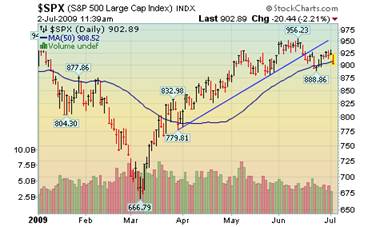 --U.S. stocks fell, sending the Standard & Poor’s 500 Index to a third straight weekly drop, as a worse-than-projected decrease in jobs added to concern that rising unemployment will prolong the recession. The S&P 500 has slumped 3.7 percent since June 12 on concern the 40 percent, three-month surge in the index outpaced prospects for a recovery in the economy and corporate profits. Next week launches earnings reports, which will reveal the extent to which hope may have overtaken reality.
--U.S. stocks fell, sending the Standard & Poor’s 500 Index to a third straight weekly drop, as a worse-than-projected decrease in jobs added to concern that rising unemployment will prolong the recession. The S&P 500 has slumped 3.7 percent since June 12 on concern the 40 percent, three-month surge in the index outpaced prospects for a recovery in the economy and corporate profits. Next week launches earnings reports, which will reveal the extent to which hope may have overtaken reality.
Treasury bonds gain as alternative investments slip.
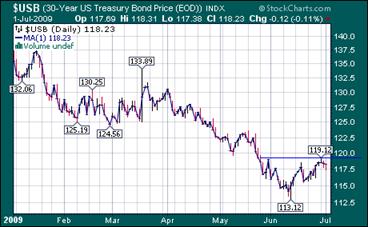 -- Treasuries gained after a government report showed the U.S. economy lost more jobs than forecast in June, fueling speculation that rising unemployment will prolong the worst recession in a half-century. The employment data supports that assertion and will likely allow policy makers to keep the borrowing rates lower for longer. Traders decreased odds that the central bank will tighten, predicting a 26 percent probability that officials will increase rates by November, down from 67 percent after last month’s jobs report.
-- Treasuries gained after a government report showed the U.S. economy lost more jobs than forecast in June, fueling speculation that rising unemployment will prolong the worst recession in a half-century. The employment data supports that assertion and will likely allow policy makers to keep the borrowing rates lower for longer. Traders decreased odds that the central bank will tighten, predicting a 26 percent probability that officials will increase rates by November, down from 67 percent after last month’s jobs report.
Gold losing traction.
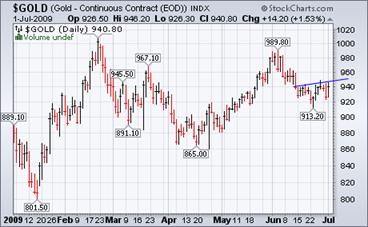 Gold fell below $930 (U.S.) per ounce on Thursday as the U.S. dollar rose versus a basket of currencies after a larger than expected dip in U.S. non-farm payrolls, which prompted some buying of the currency as a haven from risk. “Today's payrolls surprised most market expectations, and the dollar rose as a result,” said Pradeep Unni, senior analyst at Richcomm Global Services. “However, the data is not likely to have a long term impact on the (gold) market.” The sell-off in gold today was triggered by selling in the currency and stock markets.
Gold fell below $930 (U.S.) per ounce on Thursday as the U.S. dollar rose versus a basket of currencies after a larger than expected dip in U.S. non-farm payrolls, which prompted some buying of the currency as a haven from risk. “Today's payrolls surprised most market expectations, and the dollar rose as a result,” said Pradeep Unni, senior analyst at Richcomm Global Services. “However, the data is not likely to have a long term impact on the (gold) market.” The sell-off in gold today was triggered by selling in the currency and stock markets.
The Nikkei sees deterioration in the trend.
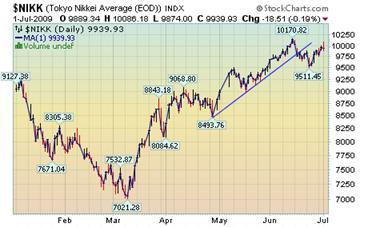 -- Japanese stocks dropped for a second day, led by banks as concern a merger will fail to produce a stronger lender drove down Aozora Bank Ltd. and Shinsei Bank Ltd. Oil producers fell on lower crude prices. The pattern in the Nikkei is similar to the S&P 500 index, which show how closely linked the two economies are. It may be safe to say that things may deteriorate from here, since the U.S. employment number took another hit today.
-- Japanese stocks dropped for a second day, led by banks as concern a merger will fail to produce a stronger lender drove down Aozora Bank Ltd. and Shinsei Bank Ltd. Oil producers fell on lower crude prices. The pattern in the Nikkei is similar to the S&P 500 index, which show how closely linked the two economies are. It may be safe to say that things may deteriorate from here, since the U.S. employment number took another hit today.
While China seems unstoppable.
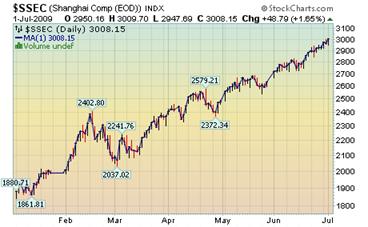 -- China’s stocks rose, driving the Shanghai Composite Index to its biggest gain in a month, as signs the world’s third-largest economy is recovering spurred optimism that demand for energy and raw materials will increase. “Resources stocks act as a proxy to China’s recovery story,” said Wang Zheng, a fund manager at Jingxi Investment Management Co. in Shanghai. “It looks like the market needs a correction now as valuations are expensive and expectations about the economic recovery have been priced in.”
-- China’s stocks rose, driving the Shanghai Composite Index to its biggest gain in a month, as signs the world’s third-largest economy is recovering spurred optimism that demand for energy and raw materials will increase. “Resources stocks act as a proxy to China’s recovery story,” said Wang Zheng, a fund manager at Jingxi Investment Management Co. in Shanghai. “It looks like the market needs a correction now as valuations are expensive and expectations about the economic recovery have been priced in.”
Oh, nevermind!
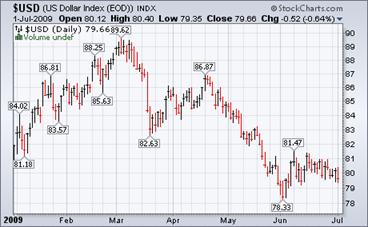 -- The dollar strengthened after a Chinese Foreign Ministry official said he hoped the greenback would remain stable and was “not aware” of a plan to discuss a new reserve currency at next week’s Group of Eight meeting. The dollar climbed from a three-week low versus the euro after falling yesterday when Reuters reported that China had asked to debate proposals for a new global reserve currency at the G-8 summit in Italy.
-- The dollar strengthened after a Chinese Foreign Ministry official said he hoped the greenback would remain stable and was “not aware” of a plan to discuss a new reserve currency at next week’s Group of Eight meeting. The dollar climbed from a three-week low versus the euro after falling yesterday when Reuters reported that China had asked to debate proposals for a new global reserve currency at the G-8 summit in Italy.
Foreclosures are going upscale.
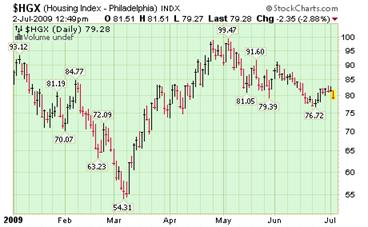 Newfound signs of stability in the housing market could still be threatened by rising foreclosures and slow efforts to stop them, according to two reports released Tuesday.The Standard & Poor's/Case-Shiller index of 20 major cities showed the smallest monthly decline since June 2008. The index tumbled by 18 percent in April from the year before, but for the third month in a row it was not a record decline. Here’s a view of the index. However, Mish reports that prime mortgages are now increasingly at risk.
Newfound signs of stability in the housing market could still be threatened by rising foreclosures and slow efforts to stop them, according to two reports released Tuesday.The Standard & Poor's/Case-Shiller index of 20 major cities showed the smallest monthly decline since June 2008. The index tumbled by 18 percent in April from the year before, but for the third month in a row it was not a record decline. Here’s a view of the index. However, Mish reports that prime mortgages are now increasingly at risk.
It looks like a break in the price of gasoline.
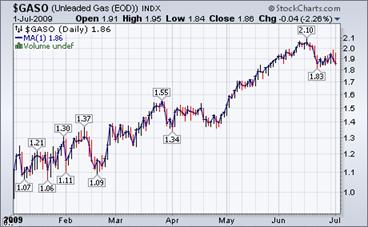 Energy Information Administration Weekly Report suggests that, “Heading into the 4th of July weekend, U.S. drivers are understandably concerned about gasoline prices, which have risen by more than $1 per gallon so far in 2009, and by nearly 60 cents per gallon since the beginning of May. On the other hand, gasoline prices remain well below last summer’s record levels, and actually posted a decrease in the past week. Have we already seen the worst for this year?”
Energy Information Administration Weekly Report suggests that, “Heading into the 4th of July weekend, U.S. drivers are understandably concerned about gasoline prices, which have risen by more than $1 per gallon so far in 2009, and by nearly 60 cents per gallon since the beginning of May. On the other hand, gasoline prices remain well below last summer’s record levels, and actually posted a decrease in the past week. Have we already seen the worst for this year?”
Ample supply and a slow economy keeps prices down.
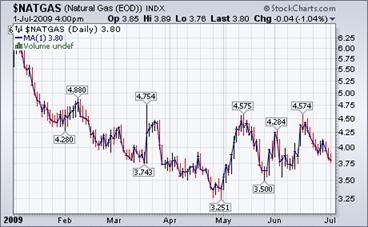 The Energy Information Agency’s Natural Gas Weekly Update reports, “Almost on cue with the official start of summer this week, temperatures in the southern and middle parts of the country soared, likely boosting air-conditioning demand. Although cooling demand represents a major consumption segment in the natural gas industry, in the past week higher demand from electric generation companies seems to have only limited declines in prices. Concerns over the state of the economy and ample supplies continued to dominate the pricing environment.”
The Energy Information Agency’s Natural Gas Weekly Update reports, “Almost on cue with the official start of summer this week, temperatures in the southern and middle parts of the country soared, likely boosting air-conditioning demand. Although cooling demand represents a major consumption segment in the natural gas industry, in the past week higher demand from electric generation companies seems to have only limited declines in prices. Concerns over the state of the economy and ample supplies continued to dominate the pricing environment.”
Theft in plain view.
The Federal Reserve is living up to its purpose, which is to enrich bankers at the expense of everyone else. Ben Bernanke, who chairs the Federal Reserve Board, is to be congratulated for his open call for the banks under his tutelage to receive billions more of our tribute.
Let us understand the matter clearly. We have exited a significant boom period. During the boom, the bankers made large and very large profits. The managements took home very large pay and bonuses. The stockholders (including officers and managers of the banks) had, for a time, very large wealth in the stocks they held. The bondholders of the banks had, for a time, very secure debts.
But the bankers over-reached for business in several ways. They extended a slew of bad loans during the lately departed boom. The stocks and bonds fell in price, reflecting the lower worth of the bank assets, these bad loans. And now that the boom is over, the bankers, led by Mr. Bernanke, want us to eat their losses.
Our Investment Advisor Registration is on the Web
We are in the process of updating our website at www.thepracticalinvestor.com to have more information on our services. Log on and click on Advisor Registration to get more details.
If you are a client or wish to become one, please make an appointment to discuss our investment strategies by calling Connie or Tony at (517) 699-1554, ext 10 or 11. Or e-mail us at tpi@thepracticalinvestor.com .
Anthony M. Cherniawski,
President and CIO
http://www.thepracticalinvestor.com
As a State Registered Investment Advisor, The Practical Investor (TPI) manages private client investment portfolios using a proprietary investment strategy created by Chief Investment Officer Tony Cherniawski. Throughout 2000-01, when many investors felt the pain of double digit market losses, TPI successfully navigated the choppy investment waters, creating a profit for our private investment clients. With a focus on preserving assets and capitalizing on opportunities, TPI clients benefited greatly from the TPI strategies, allowing them to stay on track with their life goals
Disclaimer: The content in this article is written for educational and informational purposes only. There is no offer or recommendation to buy or sell any security and no information contained here should be interpreted or construed as investment advice. Do you own due diligence as the information in this article is the opinion of Anthony M. Cherniawski and subject to change without notice.
Anthony M. Cherniawski Archive |
© 2005-2022 http://www.MarketOracle.co.uk - The Market Oracle is a FREE Daily Financial Markets Analysis & Forecasting online publication.



